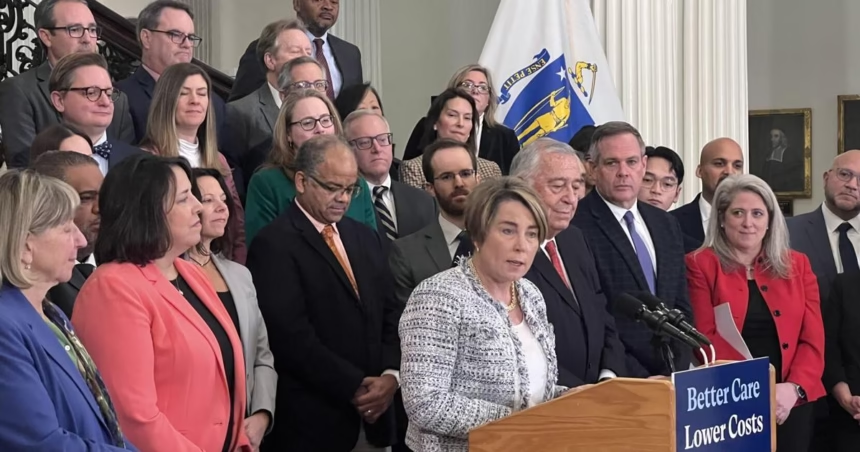Governor Maura Healey has signed two significant healthcare bills into law, marking a crucial step toward reducing healthcare expenses and enhancing regulatory supervision of Massachusetts’ healthcare system.
The legislation, comprising S.3012, focused on drug affordability, accessibility and transparency, and H.5159, aimed at strengthening market evaluation procedures, seeks to reduce prescription medication expenses, enhance primary care access and address regulatory gaps exploited by private healthcare entities.
“These legislative measures will provide financial relief to patients by implementing a $25 cap on essential medications and enhancing industry transparency,” stated Governor Healey, adding that the laws also tackle “regulatory shortcomings, ensuring that profit-driven healthcare providers such as Steward Health Care face identical transparency requirements as their nonprofit counterparts.”
Lieutenant Governor Kim Driscoll emphasized Massachusetts’ leadership in medical advancement and life sciences. “This legislation reinforces our commitment to delivering high-quality healthcare while maintaining industry accountability to the public,” she remarked.
The newly enacted laws establish a $25 co-payment ceiling for certain medications, eliminate cost-sharing requirements for specific generic drugs, and ensure uninterrupted coverage for patients transitioning between insurance plans. They also broaden the supervisory authority of the Health Policy Commission (HPC) and other regulatory bodies, strengthening oversight of private healthcare entity transactions.
House Speaker Ronald J. Mariano emphasized these reforms’ urgency, particularly regarding previous challenges with Steward Health Care. “Corporate leaders have consistently concealed their financial records from regulators, endangering patient safety and healthcare system integrity. This necessitates empowering our institutions with proper oversight tools,” he stated.
Senate President Karen E. Spilka expressed optimism about the laws’ potential impact on healthcare accessibility and transparency. “The Governor’s approval of these legislative measures reinforces our global healthcare leadership position and ensures that Massachusetts prioritizes patient welfare above financial interests,” she noted.
Health and Human Services Secretary Kate Walsh particularly praised the establishment of a primary care-focused task force under the new legislation. “We understand that primary care access fundamentally supports health equity, and I’m particularly enthusiastic about strengthening our primary care infrastructure to benefit more Massachusetts residents,” she commented.
The legislation additionally addresses private healthcare investment oversight, restricting certain licensing practices and requiring greater transparency in ownership structures and financial dealings. Senator Cindy F. Friedman, who leads the Joint Committee on Health Care Financing, expressed confidence that these measures would effectively balance patient and provider interests. “These provisions will ensure that patient care takes priority over profit motives and guarantee residents’ access to high-quality, accessible, and affordable healthcare services,” she concluded.
Prominent healthcare leaders expressed strong endorsement for these legislative measures. Amy Rosenthal, who heads Health Care For All, emphasized that these regulations mark “essential progress” toward achieving healthcare equity and improved access. Lora Pellegrini, serving as President and CEO of the Massachusetts Association of Health Plans, voiced her backing for the enhanced oversight framework, highlighting its vital role in protecting consumers and ensuring market accountability.
This legislative package represents a pivotal advancement in transforming Massachusetts’ healthcare landscape, primarily focusing on improving accessibility, boosting transparency, and guaranteeing equitable healthcare access across all population segments.







